- Home
- Burt L. Standish
The Cruise of the Snowbird: A Story of Arctic Adventure Page 13
The Cruise of the Snowbird: A Story of Arctic Adventure Read online
Page 13
"Portree is our destination, andthough by going south we would have a favouring wind at first, we wouldnever get past Loch Alsh; besides, if you look at the chart you'll findthat northwards is nearer. And now, Rory, please, no more talk; youjust untie the mainsail cover and undo the tyers, that's your work,because you're neat."
"Thank you," said Rory.
"Mainsheet all right?"
"All right, sir."
"Well, heave away and shorten cable.
"So--top the boom, hook on, hoist together. Up goes the gaff. Welldone, lads, and handily. Belay--why, I have hardly to speak. Well doneagain. Now, if your sheets are shipshape, up with the jib and foresail.
"Trip the anchor, and on board with it. There we are, Rory; we're goingon the starboard tack a little way; just cant her head. Now she feelsit. Belay halyards, and coil the slack. That's right and not lubberly.Rory, you'll make the best sailor of the lot of us. No, never mind thetopsail for a bit. Presently though. Now I'll steer for a little. Wemay have a puff when we clear the cliffs. Meanwhile, hoist your morselof ensign, and, Rory, fire that farthing gun of yours."
"The farthing gun made a deal of noise for the price of it, anyhow,"said Rory.
Hardly had the sound ceased reverberating from among the cliffs, whentwo white puffs of smoke rose up from under the nearest tree, and then,bang! bang! came the sound towards them. "Good-bye" it seemed to say.It was Macallum, the keeper, with his double-barrelled gun.
There was not much of a breeze after all, and plenty of sail beingcarried, they bowled along beautifully on the starboard tack, sailingmoderately, but not _too_ close to the wind. Although every now andthen the cutter elevated her bows, and brought them down again with apeevish thud that sent the spray flying from stem to stern, nobodyminded that a bit; the weather was warm, the water was warm, and besidesthey were all encased in oilskins.
Indeed it was one of the most enjoyable cruises they had ever had,counting from their departure from Glen Talisker to their arrival atPortree. McBain knew the coast well. He did not hug it, neither did heput far out to sea; he put her about on the other tack shortly, as if hemeant to go up Loch Bacadale. Presently they were not far off IdrigailPoint, and the cutter was once more laid on the starboard tack, andsails being trimmed, and everything working well, there was time forconversation.
"Shall I steer?" said Rory, who was never happier than when he was "theman at the wheel."
"Not just yet," said McBain; "when we're round Point Aird, very likelyI'll let you do as you please; but, boys, I've got that falling glass onthe brain, and I want to take every advantage, and fight for everycorner."
"Look now, Ralph and Rory, you've never been so close in-shore before.Allan, don't _you_ speak, you have. The day is bright and clear; do yousee McLeod's Table?"
"The never a table see I," said Rory.
"Well," continued McBain, "that lofty mountain with the flat top is socalled."
"And a precious big feast McLeod could spread there too," said Allan.
"And a precious big feast he did one time spread," replied McBain, "ifan old Gaelic book of mine is anything to go by."
"Tell us," cried Rory, who was always on tiptoe to hear a tale.
"It would seem, then, that the McLeods and the McDonalds were, in oldtimes, deadly foes; although at times they appeared to make it up, andvowed eternal friendship. The chief McLeod invited the McDonalds onceto a great `foy,' and after eating and drinking on the top of that greathill, until perhaps they had had more than enough, three hundred armedHighlanders sprang from an ambush among the rocks and slew the McDonaldswithout mercy. Their flesh was literally given to the eagles, as WalterScott expresses it, and their bones, which lay bleaching on the mountaintop, have long since mouldered to dust.
"On another occasion," continued McBain, "the McLeods surprised twohundred McDonalds at worship, in a cave, and building fires in front ofit, smothered them. The poor half-burned wretches that leapt outthrough the flames speedily fell by the edge of the sword."
"What cruel, treacherous brutes those McLeods must have been," remarkedRalph.
"Well," said McBain, "war is always cruel, and even in our own daytreachery towards the enemy is far from uncommon; but, mind you, theMcDonalds were not sinless in this respect either. A chief of this boldclan once invited a chief of the McLeods to dinner in his castle ofDuntulm."
"I wouldn't have gone a step of my toe," cried Rory.
"But McLeod did," said McBain, "and he went unarmed."
"Ha! ha!" laughed Allan; "it strikes me they were playing the rogue'sgame of `confidence.'"
"Something very like it, but McDonald apparently didn't know how kind tobe to his guest, and pressed him to eat and drink _galore_, as we say.McDonald even showed McLeod to his bedroom, and, for the first timeperhaps in his lifetime, poor McLeod began to quake when he foundhimself within the donjon-keep.
"`There is your bedroom,' said the stern McDonald. `Yonder is whereyour body will lie, and yonder is where your bones will repose when therats have done with them.'
"McLeod would have tried to rush out, but strong arms were there tothrust him back. No one came near the prisoner for two days, thenthrough the barred window food was handed him, salt-sodden flesh and aflask of water. He ate greedily, then applied the jar to his lips toquench his thirst. Horror! the water was seawater."
"And he perished of thirst?" inquired Ralph.
"So the story goes," replied McBain.
"A chief of the McLeods," said McBain, "one of the very, _very_ oldestof the chiefs, had a large family of grown-up daughters, and theywouldn't always obey the old man, and one day, instead of attending uponhim--for he was blind--they went to bathe and disport themselves amongthe billows, but a sea-nymph came and turned them all into stone."
"And served them right," said Rory.
"And there they stand; those tall black rocks, well in towards the pointyonder, with the white waves dashing among their feet. They are calledMcLeod's maidens until this day."
"Well," said Ralph, with a quiet smile, "there is no mistake about it--there were giants in those days."
They were nearly at Dunvegan Head by this time, standing, in fact, wellin towards it on the port tack, for the waters are deep even closein-shore. When they had left it on the beam they opened out broad LochFollart, when McBain, pointing landwards, said,--
"In there is a little bay, called Loch Bay, and by it a rural hamlet orvillage, which is claimed as the real capital of Skye. It is calledStein."
"But see, see," cried Rory. "Is that a geyser rising out of the seabetween us and the shore?"
"Why, it is very like a fountain," said Ralph.
"It is very like a whale," said Allan, and McBain laughed.
"It is a whale," he added. "It is the solitary, or caa'in' whale, andthe rascal is in there after the herrings. A more independent brutedoesn't swim in the sea. He ignores a boat. He looks upon mankind aspoor, miserable, puny creatures, and I don't think he would go very farout of his way for a line-of-battle ship."
An hour or two afterwards they came in sight of Duntulm Castle,previously having passed the little church of Kilmuir, with itsbleak-looking stone-built manse. Near it is a graveyard, which had verygreat interest for poetic Rory.
"Poor Flora McDonald!" he almost sighed. "I always think that PrinceCharlie should have taken her away with him to sunny Italy and marriedher. How beautifully the story of the ill-fated prince would have readhad it ended thus!"
"Rory," said Ralph, "I'll leave you to dream and romance while I go andsee about the luncheon."
"So like an Englishman," said Rory.
"Never mind," replied Ralph; "we can't be all alike. What if I _do_prefer roly-poly to romance; don't the English win all their battles onbeefsteak?"
"Yes, it is time for you to dive in," said Rory, laughing; "but there,hand out my fiddle and I'll forgive you. If the sea-nymphs will only bekind now," he continued, "and keep me dry, I'll play and sing yousomething appro
priate."
He did, in his sweet tenor voice, accompanying himself with hisfavourite instrument. He sang them the old song that begins:
"Far over the hills and the heather so green, And down by the corrie that sings to the sea, The bonnie young Flora sat weeping alane, The dew on her plaid and the tear in her e'e. She looked at a boat with the breezes that swung, Away on the wave like a bird of the main, And ay as it lessened, she sigh'd and she sung, `Fareweel to the lad I shall ne'er

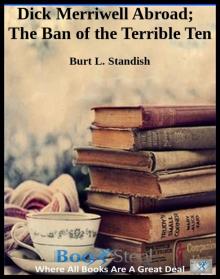 Dick Merriwell Abroad; Or, The Ban of the Terrible Ten
Dick Merriwell Abroad; Or, The Ban of the Terrible Ten Wild Adventures round the Pole
Wild Adventures round the Pole Storm-Bound; or, A Vacation Among the Snow Drifts
Storm-Bound; or, A Vacation Among the Snow Drifts In the Yellow Sea
In the Yellow Sea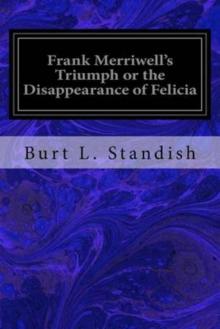 Frank Merriwell's Triumph; Or, The Disappearance of Felicia
Frank Merriwell's Triumph; Or, The Disappearance of Felicia Treasure of Kings
Treasure of Kings Bert Wilson's Twin Cylinder Racer
Bert Wilson's Twin Cylinder Racer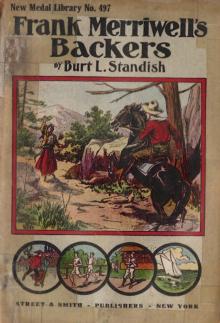 Frank Merriwell's Backers; Or, The Pride of His Friends
Frank Merriwell's Backers; Or, The Pride of His Friends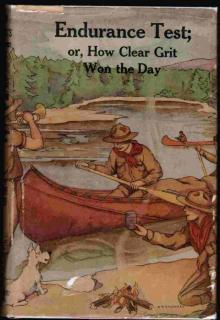 Endurance Test; or, How Clear Grit Won the Day
Endurance Test; or, How Clear Grit Won the Day Great Hike; or, The Pride of the Khaki Troop
Great Hike; or, The Pride of the Khaki Troop The Swan and Her Crew
The Swan and Her Crew A cup of sweets, that can never cloy: or, delightful tales for good children
A cup of sweets, that can never cloy: or, delightful tales for good children Frank Merriwell's Bravery
Frank Merriwell's Bravery Frank Merriwell Down South
Frank Merriwell Down South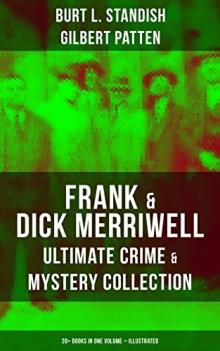 Dick Merriwell's Trap; Or, The Chap Who Bungled
Dick Merriwell's Trap; Or, The Chap Who Bungled The Trail of the Seneca
The Trail of the Seneca Wild Life in the Land of the Giants: A Tale of Two Brothers
Wild Life in the Land of the Giants: A Tale of Two Brothers From Squire to Squatter: A Tale of the Old Land and the New
From Squire to Squatter: A Tale of the Old Land and the New The Cruise of the Snowbird: A Story of Arctic Adventure
The Cruise of the Snowbird: A Story of Arctic Adventure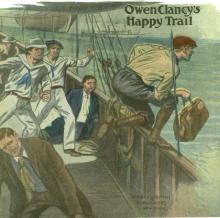 Owen Clancy's Happy Trail; Or, The Motor Wizard in California
Owen Clancy's Happy Trail; Or, The Motor Wizard in California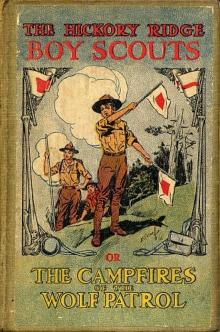 Boy Scouts: Tenderfoot Squad; or, Camping at Raccoon Lodge
Boy Scouts: Tenderfoot Squad; or, Camping at Raccoon Lodge Sing a Song of Sixpence
Sing a Song of Sixpence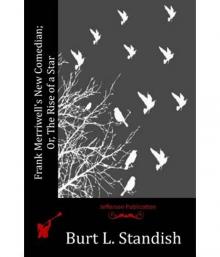 Frank Merriwell's New Comedian; Or, The Rise of a Star
Frank Merriwell's New Comedian; Or, The Rise of a Star The Sa'-Zada Tales
The Sa'-Zada Tales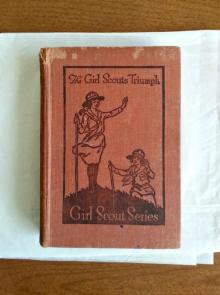 The Girl Scout's Triumph; or, Rosanna's Sacrifice
The Girl Scout's Triumph; or, Rosanna's Sacrifice Wild Adventures in Wild Places
Wild Adventures in Wild Places Fairies I Have Met
Fairies I Have Met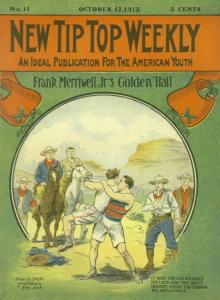 Frank Merriwell's Son; Or, A Chip Off the Old Block
Frank Merriwell's Son; Or, A Chip Off the Old Block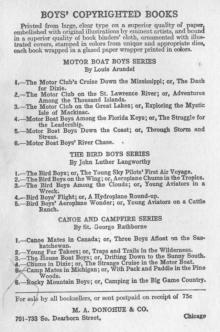 Motor Boat Boys' River Chase; or, Six Chums Afloat and Ashore
Motor Boat Boys' River Chase; or, Six Chums Afloat and Ashore Frank Merriwell's Athletes; Or, The Boys Who Won
Frank Merriwell's Athletes; Or, The Boys Who Won Bart Keene's Hunting Days; or, The Darewell Chums in a Winter Camp
Bart Keene's Hunting Days; or, The Darewell Chums in a Winter Camp Captain June
Captain June